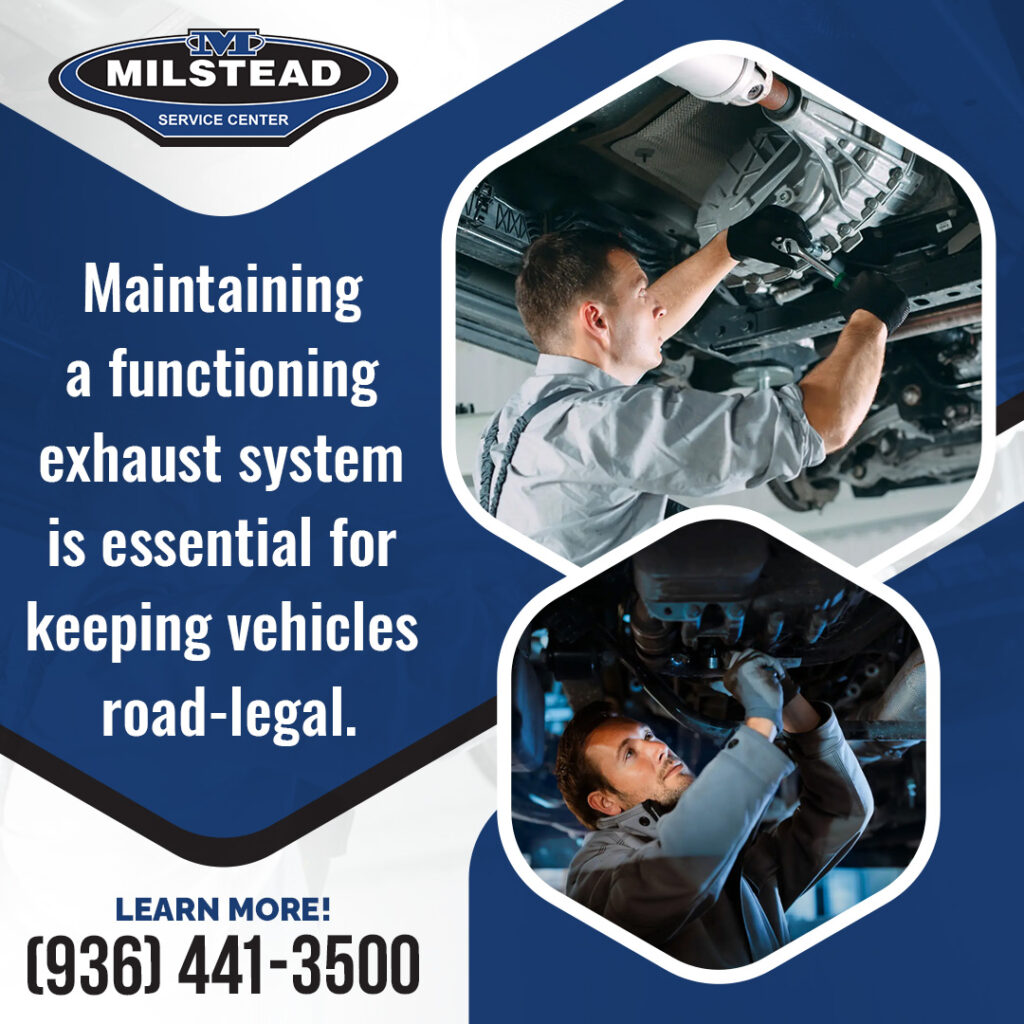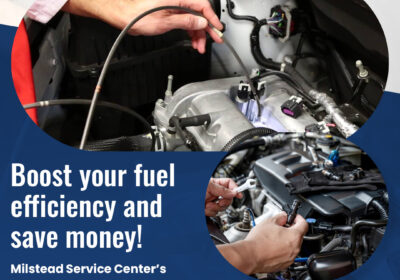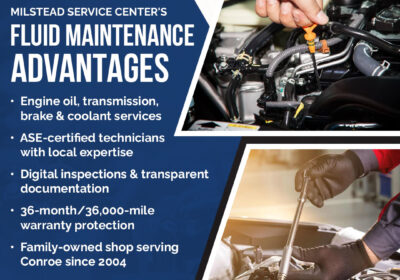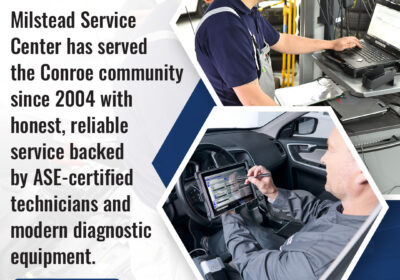Exhaust system repairs help your vehicle run efficiently, reduce emissions, and prevent engine damage. If your vehicle is louder than usual or shows signs of poor performance, the exhaust system may be the problem. At Milstead Service Center in Conroe, TX, our team handles exhaust repairs with precision. If you’re hearing loud noises, smelling fumes, or seeing dashboard alerts, our auto repair technicians can identify the problem and fix it using proven repair methods you can trust. This article outlines what to expect during the repair process and explains how a healthy exhaust system supports overall vehicle performance.

Role of the Exhaust System
The exhaust system removes combustion gases, reduces engine noise, and supports emission control. It keeps your vehicle running efficiently and safely by routing harmful gases away from the cabin and engine.
The system collects exhaust gases from the engine and converts the pollutants into less harmful substances. Then, it releases them through the tailpipe. Your vehicle can experience poor fuel economy, failed emissions tests, and unsafe driving conditions if the exhaust system is not functioning properly.
A well-maintained exhaust system also protects other vehicle components, like the engine and fuel system, from overheating or damage caused by pressure buildup. It plays a direct role in meeting local emissions regulations and keeping your vehicle road-legal in Texas.
Key Components of a Standard Exhaust System
A typical exhaust system includes the exhaust manifold, oxygen sensors, catalytic converter, resonator, muffler, and exhaust pipes. Each part has a specific function that helps the system operate correctly.
These components work together to reduce emissions, lower noise, and manage heat. Damage to any one of them can cause noticeable performance issues, such as power loss, increased fuel use, or louder engine sounds.
Exhaust Manifold
The exhaust manifold directs the exhaust gases collected from the engine’s cylinders into the exhaust pipe. It’s made of cast iron or stainless steel and withstands high temperatures. If the manifold cracks or leaks, it can cause engine noise, poor fuel efficiency, and the smell of exhaust in the cabin.
A damaged manifold can also reduce engine performance by disrupting pressure levels within the exhaust flow. This is one of the common reasons for failed emissions inspections in older vehicles.
Oxygen Sensors
Oxygen sensors monitor the oxygen content in the exhaust gases to determine the air-to-fuel ratio and send that data to the engine control unit (ECU). This helps the ECU adjust fuel delivery for better performance and lower emissions.
Most vehicles have one sensor before and one after the catalytic converter. If a sensor fails, it can cause engine misfires, poor fuel economy, and trigger the check engine light. According to CarMD’s 2023 Vehicle Health Index, faulty oxygen sensors were one of the top five reasons for checking engine light activations.
Catalytic Converter
The catalytic converter reduces harmful gases like carbon monoxide, hydrocarbons, and nitrogen oxides. It uses precious metals like platinum, palladium, and rhodium to convert these into safer compounds.
A clogged or damaged catalytic converter may restrict exhaust flow, reduce engine power, or cause overheating. It’s also a common target for theft due to the value of the metals inside. Replacement costs typically range from $800 to $2,500 or more, depending on the make, model, and labor.
Resonator and Muffler
The resonator and muffler reduce exhaust noise and help with airflow. While the resonator tunes sound frequencies, the muffler absorbs noise using chambers or baffles. If either component is damaged, your vehicle may become noticeably louder. A failing muffler may alter exhaust backpressure, potentially impacting engine efficiency, fuel economy, and performance.
Exhaust Pipes
Exhaust pipes connect all system components and direct gases out of the tailpipe. They must remain sealed and free of rust or holes to ensure safe exhaust flow. Leaks in the pipes can allow gases like carbon monoxide to enter the cabin, posing health risks. Pipe damage can affect exhaust flow and sensor readings, leading to inaccurate fuel-air adjustments and reduced performance. Regular inspection helps catch rust or damage before it leads to larger problems.
Regular exhaust inspections at Milstead Service Center can help detect early problems before they affect engine performance or emissions. These checks are part of our full-service approach to auto repair in Conroe, TX.
Common Signs of Exhaust System Problems
Exhaust issues often show up through louder noise, strange smells, reduced fuel efficiency, or engine warning lights. Identifying these symptoms early can prevent more costly engine or emissions repairs. Below are five common indicators that your vehicle may need exhaust system service. If you notice any of these problems, it’s a good idea to schedule an inspection at Milstead Service Center, a trusted provider of auto repair in Conroe, TX.
Excessive Engine Noise
A damaged muffler or exhaust pipe can cause your engine to sound much louder than normal. If your car sounds like it’s revving more aggressively or has a low rumble, the muffler could be corroded or cracked. A failing resonator or a loose exhaust component can also increase noise levels.
Smell of Exhaust Inside the Cabin
Exhaust fumes inside the vehicle indicate a leak, which can be dangerous. Carbon monoxide is odorless but can mix with other gases that create a noticeable smell. If exhaust gases are entering the cabin, the leak may be in the exhaust manifold or one of the pipes. It must be addressed immediately as it poses serious health risks.
Decline in Fuel Efficiency
A faulty exhaust system can make the engine work harder, reducing fuel efficiency. If the oxygen sensor or catalytic converter is malfunctioning, it disrupts the air-to-fuel ratio. This forces the engine to burn more fuel than necessary. A clogged catalytic converter can also restrict exhaust flow, increasing backpressure and lowering miles per gallon (MPG). Drivers might notice they’re refueling more often than usual, even with the same driving habits.
Engine Performance Issues and Vibration
Exhaust leaks can reduce engine power and cause shaking, especially when accelerating or idling. When the pressure in the exhaust system drops due to a leak, the engine may misfire or stall. Loose exhaust parts can also cause vibrations that you feel through the steering wheel or the floor. In some cases, this may be traced back to a cracked manifold or worn-out hangers that let the system rattle against the undercarriage.
Dashboard Warning Lights Related to Emissions
If your check engine light comes on, it could be triggered by a failing oxygen sensor or catalytic converter. The sensors in modern vehicles monitor emissions performance. A drop in system efficiency can cause the onboard computer to turn on the warning light.
If you see this light and your car is also experiencing poor mileage or noise, it’s a good idea to visit a nearby auto repair shop for a full diagnostic. At Milstead Service Center, our experienced technicians use advanced equipment to identify the issue and recommend necessary repairs accurately. Regular checks at a trusted Conroe, TX, auto repair shop like Milstead Service Center can keep your vehicle safe, efficient, and compliant with emissions standards.
What Happens During an Exhaust System Repair
Exhaust system repair involves inspection, diagnosis, and targeted repairs to restore safe, efficient engine performance and emissions control. Each step is designed to identify issues, fix or replace damaged parts, and confirm proper function.
When you bring your vehicle to Milstead Service Center for auto repair in Conroe, TX, our technicians follow a clear process to address exhaust system problems accurately and efficiently.
Full-System Inspection and Diagnostic Scanning
Our technicians visually inspect the exhaust system and use diagnostic tools to detect hidden issues. The process begins with checking all exhaust components for corrosion, holes, or loose connections. We also scan your vehicle’s onboard computer for emissions-related error codes. This helps detect issues like a failing oxygen sensor or an underperforming catalytic converter, even if no warning lights are visible. For example, a P0420 code often indicates a catalytic converter problem, while a P0135 code can point to a faulty oxygen sensor.
Identifying Damage or Wear
Once scanned, our Conroe, TX, auto repair technicians locate physical damage or worn components that are causing performance or emissions problems.
Common problems include rusted pipes, cracked manifolds, loose heat shields, or degraded gaskets. Internal damage may also be found in the muffler or catalytic converter. These issues are documented and explained clearly so you can make informed repair decisions.
At Milstead Service Center, we walk you through what’s wrong, what caused it, and how we’ll fix it—without overselling or pushing unnecessary auto repairs.
Component Repair vs. Replacement
Technicians repair minor damage when possible, but replace parts that are severely worn or beyond safe use. If a small exhaust pipe leak can be sealed or welded, that’s often the quickest and most affordable solution. However, larger cracks, severe rust, or damaged converters usually require full replacement to restore safety and emissions performance.
We use high-quality parts that match your vehicle’s original performance standards. Our auto repair team explains which components need work and why replacement may be the better long-term option.
Post-Repair Testing for Safety and Compliance
After repairs, the exhaust system is tested to confirm proper sealing, emissions performance, and safe operation. We run another diagnostic scan to check that the error codes have cleared. We check for exhaust leaks, test for abnormal noises or vibrations, and ensure the vehicle meets Texas Department of Public Safety (DPS) emissions and safety inspection standards. If repairs were made to components like the catalytic converter or oxygen sensor, we verify that fuel efficiency and engine performance are restored.
Whether you’re dealing with a loud muffler or a check engine light related to emissions, Milstead Service Center provides accurate, affordable auto repair in Conroe, TX. Our trained technicians diagnose and resolve exhaust issues with precision, helping you avoid repeat visits or bigger engine problems down the road.
Milstead Service Center’s Process for Exhaust Repairs
Milstead Service Center handles exhaust system repairs with professionalism and care.
Trained Technicians Using Professional Tools
Our certified technicians have specialized training and use professional tools to diagnose and repair exhaust systems accurately.
This expertise allows them to identify problems and address issues quickly and efficiently. For example, they use diagnostic scanners to read emissions-related codes and inspect components like oxygen sensors and catalytic converters. This ensures repairs meet the high standards customers expect from Conroe, TX, auto repair experts.
Transparent Recommendations and Service Timelines
Milstead Service Center provides clear advice on what repairs are needed and how long they will take. Customers receive detailed explanations of any problems and options for repair or replacement. We also share realistic timelines for the service to minimize inconvenience. This approach helps customers make informed decisions about their vehicle’s exhaust system.
Quality Replacement Parts That Meet OEM Standards
We use replacement parts that meet the original equipment manufacturer’s (OEM) standards for durability and performance. Using high-quality parts helps repairs last longer and keeps the vehicle functioning properly. For example, installing a certified catalytic converter keeps emissions within legal limits and supports engine efficiency. This commitment to quality is part of what sets Milstead Service Center apart in auto repair in Conroe, TX.

Schedule Exhaust System Repair in Conroe, TX Today
Exhaust system repairs play an important role in maintaining your vehicle’s performance, safety, and emissions compliance. Addressing issues on time avoids costly repairs down the road and keeps your engine running efficiently. Milstead Service Center offers professional exhaust repair services with trained technicians, transparent communication, and quality parts that meet OEM standards.
For expert exhaust system repairs and dependable Conroe, TX, auto repairs, trust Milstead Service Center. Call us today at (936) 441-3500 to schedule an inspection or service appointment. Keep your vehicle running safely and efficiently with our professional care.




